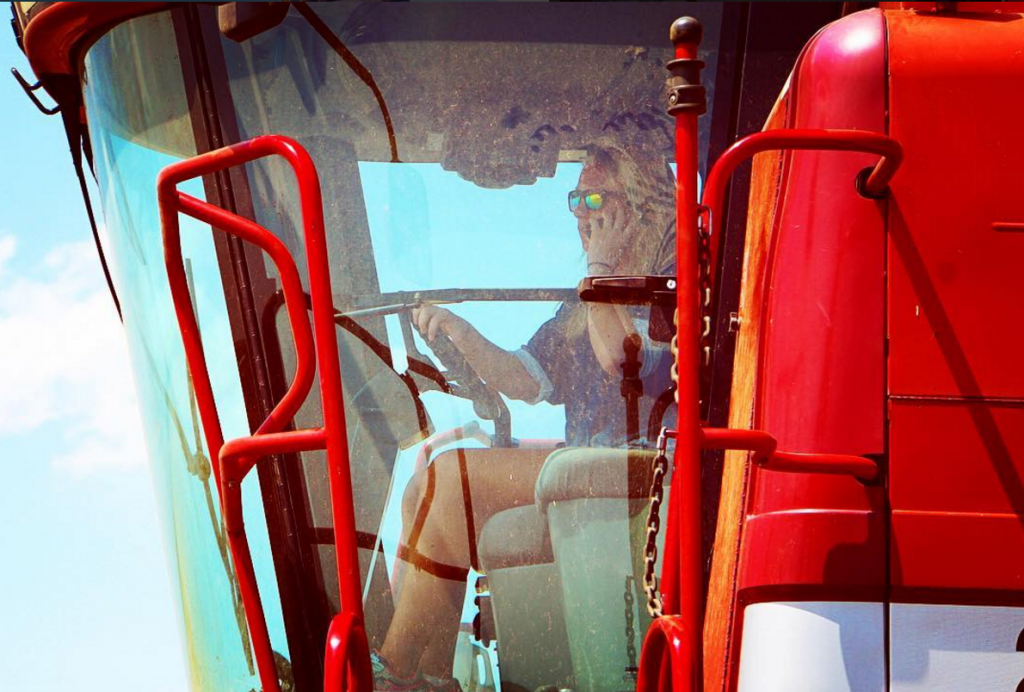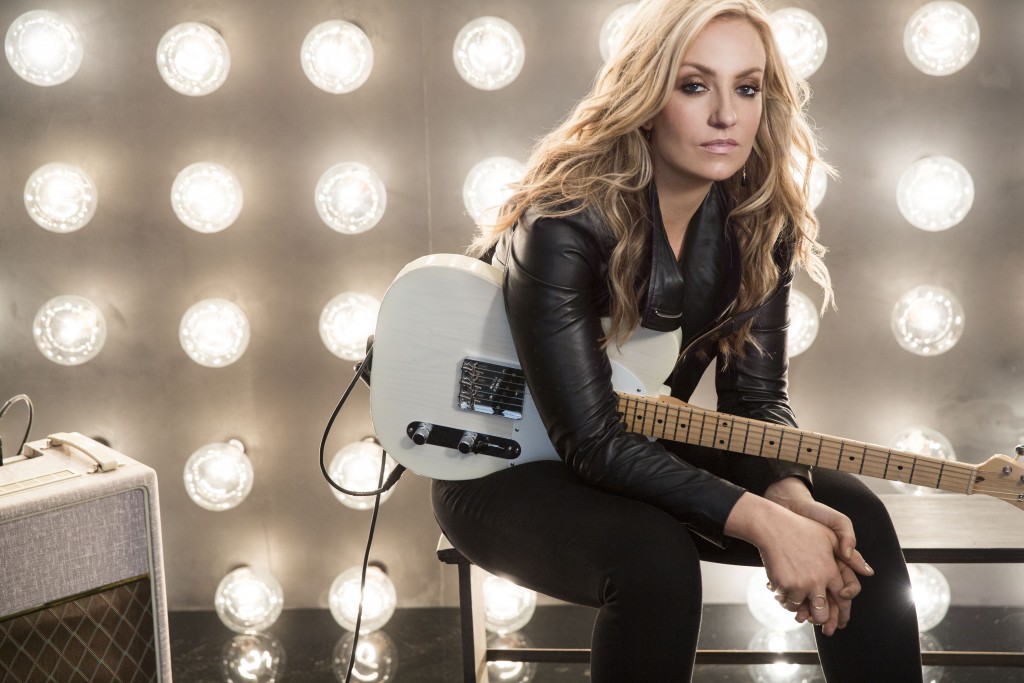There aren’t many students at Nashville’s Belmont University who spend their spring and summer breaks in the cab of an 18-wheeler, harvesting and hauling silage to afford the upcoming semester. It’s one of many distinctions that recording artist Clare Dunn holds: she’s one of the few in her family to get a break at a career like this, and one of the few artists in Nashville, especially female, to write, produce, and play guitar on her own records.
“I was a loner!” the “Tuxedo” and “Move On” singer laughs, drawing out the “lo-,” over a drink before a private event she’s playing in Nashville. The southeast Colorado native’s attire is both simple and glossy: she’s dressed in all black, with dangling silver earrings and a deep purple lipstick. For some, the path to glamour is a one-way street, but the flaxen blonde is still comfortable in a ball cap; the following day, she says excitedly, she’s heading home for harvest. It’s the first real wheat harvest her family’s had in about a decade due to extreme drought, and Dunn spent her time home doing what many country artists only sing about: working on the farm.
“We’re just farm people in my family,” Dunn says. She and her older sister grew up “like boys” – her mom, and her mom’s mom before her, drove tractors and 18-wheelers. The Dunn girls grew up similarly, doing farm chores and taking care of the family’s beef cattle.
“In the winter time around January, February, you’ll be calving out heifers,” she shares. “You have to just babysit them, and you sleep in a pickup, in front of a pen, all night. It’s 20, 15 degrees, and your whole job is to wake up every hour, every two hours, every 30 minutes depending on which cow you’re watching, and as soon as that baby is born you have to pick it up and take it into a barn so it doesn’t freeze to death. So you’re trying to haul in a 50, 60 pound calf in freezing January weather. And tend to it.”
During harvest, Dunn would be up at six and back in bed by midnight or one. “Mostly, it was just a long, hot day,” she says.
Though there wasn’t much in the way of air conditioning – Dunn notes its availability as one of the perks of Belmont – depending on which field she was working, she could get either the country or classic rock radio station. It’s not surprising once you’ve heard her music – her stories about real life pair with wailing electrics and smoky grooves.
“We had no way to afford Belmont,” Dunn continues. “But what we lack I guess in financial means we make up for in determination. So they bought this truck, and its sole purpose was to go work on a silage harvest crew.”
Dunn would drive the truck on every school break, and her family would pitch in when they could to help her make the extra money. “I remember when I first moved to Belmont I showed up two weeks late for school because I was harvesting,” she says. “I called my professors and I told them hey, I have to do this, this is how I’m paying for school, and they were like OK, we understand. I was in Texas, staying in a motel so crappy I got strep throat from the air conditioning unit, and I didn’t know it [until I got to school].”
“There was no air conditioner [in the truck], it was 113 every day, and no wind, which is rare for Texas. So I would have to get my truck up to like 45 miles per hour and stick my head out the window just to get the breeze to dry the sweat.”

It came full circle for her last year, when Bob Seger, one of her heroes, invited her to open his Ride Out Tour. Dunn still covers Seger in her set – she performs a rendition of “Her Strut” complete with a similar choreographed swagger from Dunn and her guitarists across the stage during the bridge.
Though Dunn seems like a natural on the guitar, she didn’t pick it up until Belmont, driven by a frustration with her inability to effectively communicate her desired sound. “I started playing late for most people,” she says. “I didn’t care if I was a guitar slinger or not, I just wanted to be able to get my sound out of my head and onto a set of speakers coming back at me. I couldn’t speak the language to any musicians, so I was like, maybe if I pick this up and be good, maybe that would help me make my sound.”
When she wasn’t in class, Dunn’s days consisted of waking up, getting a cup of coffee, turning on her amplifier, and playing until she couldn’t keep her eyes open. “I didn’t want to let anybody down,” she says, her voice just a step softer. “I felt if I didn’t do that, I felt guilty, you know? Cause it took so much sacrifice for me to be here, on my family’s part.”
“I know it’s the most random thing,” she continues, laughing. “But I heard Puff Daddy say one time – literally this always stuck with me – he’s like, there’s always going to be somebody out there working harder than you. And I was like, by god, there’s not gonna be! I’m gonna outwork everybody!”
It’s an ethic that’s served her well. Dunn writes all her own music, plays guitar on the recordings, and helms the production, carving out a sound that’s solidly her own. “I feel very fortunate,” she says. “To have that opportunity to be able to make a record that I believe in and to have a record label that believes in me enough to give me those reins and trust me with such a huge responsibility, that’s just been phenomenal. I want to be an artist that’s around in 30 years and I want to make music that affects people’s lives the way that I was affected by music and the way that I still feel when I listen to Bob Seger, George Strait, Alan Jackson, Creedence Clearwater Revival, the Eagles.”
With a hand in every aspect of the process, it could get overwhelming, but Dunn credits mentor and renowned songwriter Thom Schuyler with steering her focus: song first, production later. “You have an idea, and my process is all about catering to that,” she says. “It’s whatever you have to do to do that idea justice – you gotta write it fully. It takes so much focus and concentration I can’t even worry about anything else. Once it’s all written I get to breathe and think, what is this song saying, how does it sound, and then all the production is led by the song. One of the things that Thom taught me is just, the song leads the way.”
From “Ferrari,” a sizzling uptempo partly inspired by the pickups her family drove that had holes in the floorboards, to current single “Tuxedo,” in which Dunn eyes a man in a dirty white t-shirt and jeans, her control of her sound is apparent.
And it’s working. “It’s like the Field of Dreams, build it,” she says. “I’m lucky, because it’s built and they are now coming. It’s like putting your ear to the ground and hearing a train coming, you hear that rumble in the distance, but you feel it getting a little bit louder and louder.”
That night, among a group whom soon would be contributing to that rumble, Dunn echoed that gratitude. “Just being a farm girl from the middle of nowhere, any night I get to play music is a dream come true.”
Connect with Dunn on her website, Facebook, Twitter, and Instagram, and grab her debut EP on iTunes.

